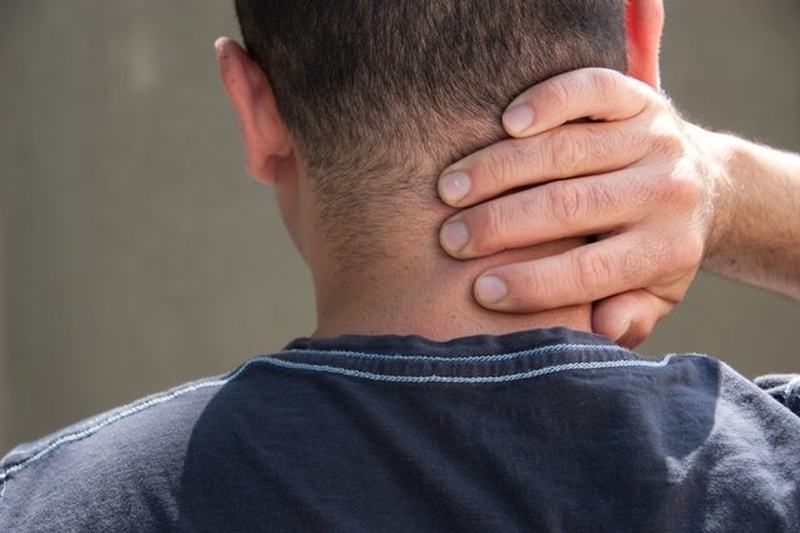Pins and needles is a common sensation that happens to most of us from time to time. It feels as though someone is gently poking you. The feeling can occur anywhere in the body, and you may want to scratch or rub the area. You may wonder “Why do I feel a needle pricking my skin?” Just read on and find what the pinching sensation in the body means for your condition.

Pinching Sensation in Body: What Causes It and How to Treat It?
Pinched Nerve
Several types of nerve damage may lead to a pinching feeling, including radiculopathy, neuralgia and nerve dysfunction, although pinched nerves are the most frequent cause of pins and needles.
A pinched nerve develops due to increased pressure on the nerves outside the brain and spinal cord, known as the peripheral nerves. This pressure can irritate or damage the nerves, and result in pain, numbness or just an uncomfortable feeling. Pinched nerves are most often associated with back and neck injuries, although any nerve in the body can be affected.
Treatments: The usual recommended treatment for pinched nerves is to rest the affected region until the symptoms have eased. You should avoid any activities that exacerbate the condition. Splints or braces can be used to immobilize the area.
The following alternative treatments can also be used to treat pinched nerves.
Medications. You can ease pain and inflammation using non-steroidal anti-inflammatory drugs, such as ibuprofen (brand names include Advil and Motrin IB) and naproxen (brand name like Aleve), or corticosteroid injections.
Surgery. If conventional treatment does not ease your symptoms after a few weeks, your doctor may consider surgery in order to ease the pressure on the pinched nerve. What the surgery entails depends on the cause of the pinched nerve. For example, an operation may consist of removing bone spurs, taking out part of a herniated disc in the spine, or cutting the carpal ligament to provide extra space for nerves to travel through the wrist.
Diabetes
The high blood sugar characteristic of diabetes can damage nerve fibers leading to random pins and needles all over the body. This condition is known as diabetic neuropathy.
The symptoms of diabetic neuropathy can vary according to where the nerves are located. Patients may experience pain or numbness in their arms and legs, digestive problems and urinary issues, and could develop issues with their blood vessels and heart. The symptoms can range in severity from mildly irritating to painful and debilitating to life-threatening.
Treatments: The most effective way of preventing diabetic neuropathy or slowing its progress is to manage the underlying diabetes by effectively controlling blood sugar levels, eating a healthy diet, and taking regular exercise.
Herpes
Herpes infection is caused by herpes simplex virus. Oral herpes can lead to cold sores around the mouth and face, whereas genital herpes affects the buttocks, anus and genitals. Herpes often causes itching, tingling, and burning in the affected area, which lasts for about a day.
Treatments: Make an appointment to see your doctor as soon as you can if you think you may have a herpes infection. Although there is no cure, prescription medicines can control the condition.
Insect Bite
Insect bites and stings from animals such as bees, wasps, scorpions, hornets, and fire ants can also result in a pinching sensation in the body. Typical reactions to insect bites include redness, swelling, and a stinging or itchy feeling. In rare cases, animal stings can cause a serious anaphylactic reaction.
Treatments: Here are some tips you can do to prevent or relieve the pinching sensation by insect bites:
Take steps to prevent bites, such as avoiding locations where you know insects are common or using insect repellant.
If you do get stung, wash the wound with soap and water.
To help ease pain and swelling, apply a cold compress to the area.
Many different gels, creams and lotions are available, with ingredients such as hydrocortisone, pramoxine and lidocaine for pain relief. Calamine lotion, and creams containing colloidal oatmeal or baking soda can ease the itching associated with insect bites.
Over-the-counter oral medications are also available. Pain-killers such as ibuprofen and acetaminophen and antihistamines may help.
If you experience any of the symptoms of anaphylaxis, including shortness of breath, an increase in heart rate, or swollen lips, get immediate medical attention.
Frostbite
When the skin and the underlying tissues become frozen, this causes an injury known as frostbite. Patients with frostbite often say that they feel a needle pricking my skin. Other signs and symptoms of frostbite include:
Skin that is very cold to the touch.
A numbing feeling.
Hard skin that may look like wax.
Skin that becomes red-, white-, blue/white-, or gray/yellow-colored.
Joint and muscle stiffness, leading to clumsiness.
In severe cases, rewarming the skin may lead to blister formation.
Skin that is exposed to cold and windy conditions is most susceptible to frostbite. The most frequent sites of frostbite are on the fingers, toes, ears, nose, cheeks and chin.
Treatments: If you think that you may be suffering from frostbite, get inside and/or warm up as soon as you can. You will need to gently rewarm any areas of the skin that may be affected.

View All Comments /Add Comment